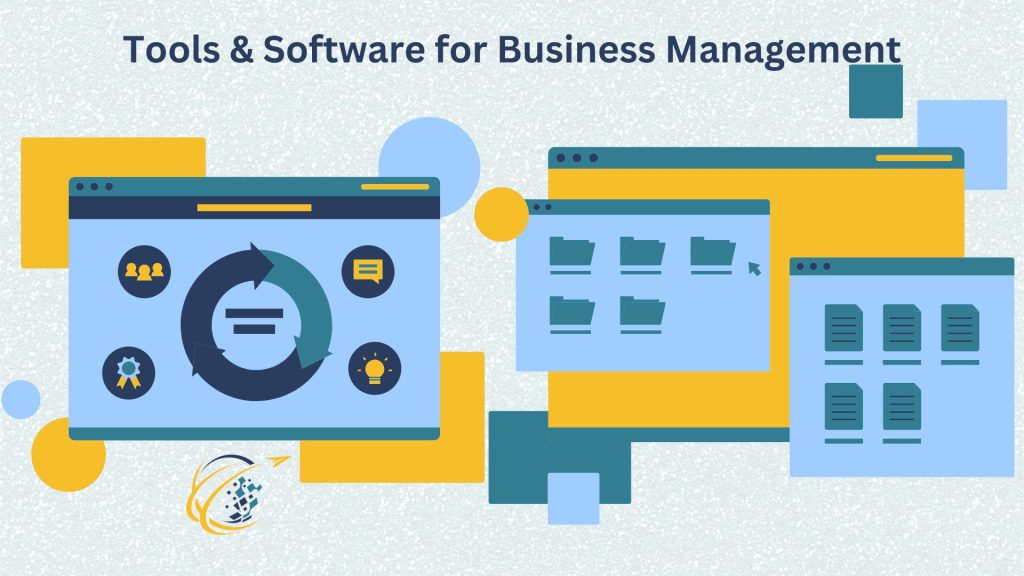Businesses depend on tools and software for business management to streamline operations, improve productivity, and also enhance decision-making. Managing a small startup or a large enterprise requires adopting the right tools to sustain growth and stay competitive. By integrating software into operations, businesses can automate tasks, improve collaboration, as well as gain insights that drive success.
The Role of Tools and Software in Modern Business Management
The success of any business depends on the tools and software that ensure smooth day-to-day operations. From project management to analytics, these solutions help businesses manage human resources, finance, and also customer relations effectively. Companies using these tools boost efficiency and make informed decisions through real-time data.
In 2024, the global business intelligence software market will reach $25.8 billion, showing the rising value of data-driven decisions. These tools for business management provide strategic advantages by allowing real-time data analysis, improving planning and forecasting.
Key Tools for Project Management and Collaboration
An essential category of business management tools is project management software, crucial for streamlining workflows and tracking progress. These tools help businesses monitor tasks and ensure timely completion of projects. Solutions like Asana, Monday.com, and Microsoft Project are industry standards, offering task tracking, time management, and collaboration features. Over 200,000 teams globally use these tools to manage complex projects efficiently.
The project management software market is expected to grow at a CAGR of 10.67% by 2025. Demand for real-time dashboards and remote communication drives this growth. These tools offer flexibility and scalability, benefiting small and large businesses alike.
Enhancing Productivity with Automation and Integration Tools
Automating routine tasks is a vital part of business management. Tools like Zapier and HubSpot automate marketing, sales, and operations. For example, Zapier connects apps and automates workflows, saving time on tasks like data entry and reporting.
Software integration enhances productivity by ensuring seamless communication between different systems. Platforms such as Slack and Trello integrate with Google Workspace, streamlining team collaboration. This integration reduces redundancies, ensuring uninterrupted business operations.
Leveraging Data Analytics and Business Intelligence
In today’s data-driven world, business management tools with analytics and business intelligence features are crucial for success. Platforms like Power BI, Tableau, and Looker Studio help companies visualize and analyze vast amounts of data efficiently. These tools allow businesses to track performance, customer behavior, and trends, enabling data-driven decisions.
The global business intelligence market is expected to exceed $180 billion by 2032, highlighting the increasing importance of these tools. As more companies adopt these solutions, real-time insights will remain key to staying competitive.
Customer Relationship Management (CRM) Software
Customer satisfaction is vital for business longevity, and this is where customer relationship management (CRM) software plays an essential role. Platforms such as Salesforce, HubSpot, and Zoho CRM offer comprehensive solutions for managing customer interactions, sales processes, and marketing efforts. By centralizing customer data, these tools help businesses build stronger relationships, track leads, and improve customer retention.
A recent study highlighted that companies using CRM software can increase sales by 29%, productivity by 34%, and forecast accuracy by 42%. CRM software has become the backbone of many companies’ customer engagement strategies, ensuring that businesses can not only attract new customers but also retain them.
Excel: A Versatile Tool for Business Management
Microsoft Excel remains one of the most widely used tools for business management due to its versatility and accessibility. From startups to large enterprises, Excel plays a crucial role in managing data, performing calculations, and creating reports. Its flexibility allows businesses to handle tasks like financial forecasting, budgeting, inventory tracking, and even project management. Excel’s powerful functions, such as pivot tables, charts, and formulas, help users analyze data and present it in a meaningful way.
One of Excel’s key strengths is its ability to automate repetitive tasks through macros and integrate with other software via VBA (Visual Basic for Applications). Additionally, Excel’s data analysis tools, such as Solver and Data Analysis Toolpak, enable businesses to run advanced analytics, optimize resources, and generate actionable insights.
Despite the rise of more sophisticated business management tools, Excel continues to thrive, partly due to its user-friendly interface and adaptability. It integrates seamlessly with other business software, allowing companies to incorporate data from various sources and streamline their workflows. For businesses that need a cost-effective yet powerful solution for data management and reporting, Excel remains an indispensable tool.
With its global user base, Microsoft Excel is still evolving, continually adding new features such as real-time collaboration, cloud-based access through Microsoft 365, and improved visualization tools to keep pace with modern business demands.
The Growing Demand for Cloud-Based Solutions
As businesses continue to adopt digital transformation strategies, the demand for cloud-based tools and software has grown significantly. Cloud platforms such as Google Workspace, Microsoft 365, and AWS offer scalable solutions that provide businesses with the flexibility to manage their operations from anywhere. The rise of remote work has accelerated the adoption of these platforms, with 54% of project managers reporting that task automation has saved them significant time on administrative tasks.
Moreover, cloud-based tools and software for business management ensure greater security and accessibility, reducing the need for extensive IT infrastructure and allowing businesses to focus on growth rather than maintenance.
In conclusion, the adoption of the right tools and software for business management is crucial for improving efficiency, productivity, and decision-making within a business. As companies continue to embrace digital transformation, the importance of selecting solutions that integrate seamlessly into daily operations cannot be overstated. Whether it’s project management, automation, data analytics, or customer relationship management, these tools have the potential to unlock new growth opportunities and drive long-term success.
For businesses looking to stay competitive in 2024 and beyond, investing in these tools is no longer optional—it’s a necessity. As the business landscape evolves, so too must the technologies that support it.


